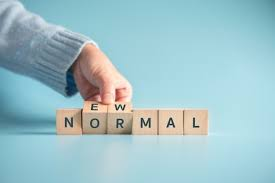
In social psychology a "new normal' is the state we settle in after a crisis. The Covid-19 pandemic introduced two such distinct crisis points. First, it disrupted the world we live in by straining (and sometimes breaking) all its systems and by challenging all its institutions. Second, it physically isolated us from each other. The result was a double whammy. We know that isolation warps the mind. The brain is a highly complex instrument that uses social contact to calibrate itself. Without it we cannot adequately create the filters necessary to guide our behavior, restrain our worst impulses and regulate our emotions.
The pandemic damaged us all in varying degrees by depriving us from this necessary calibration. Because everyone was damaged, as a result everyone's behavior is a little off. These days you see it in the news and you probably experience it directly in the heightened tension you feel in your daily life. We haven't yet recovered from its effects. This make sit hard to come to grips with the fresh challenges imposed by changing political tropes and very real environmental challenges that impact the quality of our daily life.
All of this sounds bad, I know. But we're not without recourse. Before technology was a thing or ideology was even thought of what kept us sane and made us capable was the capacity to stick together and support each other. Connectivity is a super power. The behavior we exhibit has an effect that goes much deeper than most of us think it does.
When the 'new normal' we are facing is not quite there yet because no one and nothing is quite established as an acceptable baseline we have to rely on our own desire for a world that is better than what we experience and people who are willing to raise us instead of hold us down. Within The Hive we have established exactly this kind of support network. Yet, I know from experience that it is easy to become jaded and demoralized because everything else outside it appears to be so 'off'.
Don't be. It is normal to feel bad when we have abrasive experiences, at the same time, how we react and what we subsequently do is within our control. What we say and how we say it always affects others. Our words and actions change the way those around us feel. By consciously creating a positive, uplifting experience we, collectively, help others heal which, in turn, leads to the establishment of this 'new normal' we seek which is better than what was before. Now, more than ever, we are responsible for creating the reality we want to experience and massive as this may sound as a task it is actually constructed out of the collective actions of each one of us at an individual level, both online and offline.
As always there is a sizeable chunk of research behind all this from the worlds of social psychology and neurobiology. I've kept it light here because the focus needs to be on each of us: our thoughts and our actions.
As always, if you have any questions just let me know below.

 from
from
